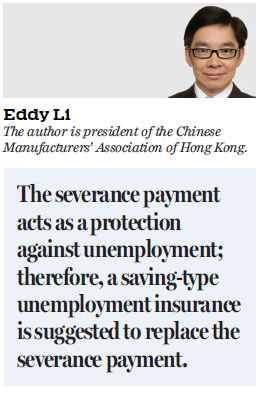Unemployment insurance can replace severance pay
Updated: 2017-09-04 06:54
By Eddy Li(HK Edition)
|
|||||||||
Eddy Li notes that most of us want the MPF offset issue resolved - redundancy coverage for staff could be a way forward
Secretary for Labour and Welfare Law Chi-kwong recently revealed that the Hong Kong government planned to come up with a brand new scheme to scrap the Mandatory Provident Fund offsetting mechanism by the end of this year. Based on the premise that the government is willing to shoulder more of the financial burden, the relevant authorities are trying to figure out some concrete numbers and how the new plan will affect both sides - labor and capital.

Generally speaking, most people want the MPF offsetting dispute solved by the new administration once and for all to reduce conflict between different social classes. As one of the representatives of the business sector, I also want the offsetting controversy to come to a satisfactory end as soon as possible; it has been troubling both employers and employees for such a long time and has somehow impaired the harmonious atmosphere in companies.
At the moment the 10-percent (5 percent from employers and 5 percent from employees) contribution to MPF, with the offsetting mechanism implemented, actually involves three parts of money - the MPF itself, the severance payment and the long-service payment. What the government and labor organizations expect from the capital side is to completely separate the latter two from MPF, in which case employers will have to pay a lot more.
From my point of view, a once-and-for-all solution should settle the three parts properly. A feasible and easy plan is to maintain the MPF but with the offsetting mechanism removed, while employers will be responsible for the severance payment and the government for the long-service payment.
The severance payment acts as a protection against unemployment; therefore, a saving-type unemployment insurance is suggested to replace the severance payment. The business sector has preliminarily agreed to pay an extra 1 percent of salary, which can be used as an insurance premium. Even if an employee is never dismissed in his/her working life, he/she can still claim the accumulated savings with the unemployment insurance plan upon retirement.
In fact, the 1-percent-extra contribution from employers will translate into an amount of approximately HK$5 billion annually, much bigger than the HK$3 billion severance and long-service payments being offset in employees' MPF accounts every year. This proposal has no doubt shown the resolve and sincerity of employers to settle the dispute over the repeal of the offsetting mechanism. After all, this is by no means an easy burden for many small and medium enterprises which are already in difficult conditions.
As for the long-service payment, I believe it belongs to the retirement protection realm and its function somehow overlaps with that of the MPF. Since the employers are already burdened with MPF contributions, the long-service payment should be integrated into the government's retirement protection scheme. An amount equivalent to between 0.5 percent and 1 percent of the salary shall be contributed by the government to the employee's MPF account, which will replace the long-service payment. This arrangement will not only ensure better retirement protection for employees but also encourage employment. The government could consider including this expenditure into its recurrent expenditure on social welfare.
This "trisection" plan has multiple advantages: Firstly, it will fully separate the MPF, severance and long-service payments, simplifying the issue; secondly, employers will find it much easier to calculate their labor costs; thirdly, the extra 1-percent contribution from employers will not only protect those who would be laid off, but also benefit all employees in the city; last but not least, the fund injection by the government can help increase social stability by solving the long-service payment issue and relieving the financial burden of SMEs.
From the perspective of a rational analysis, this is a reasonable and feasible suggestion. No matter what kind of scheme the government decides to adopt eventually, I believe the overlapping functions of the present labor protection setup should be dealt with; that the affordability of SMEs should be taken into consideration; and that the scheme cannot be too complicated lest it harms the business environment in Hong Kong.
(HK Edition 09/04/2017 page11)